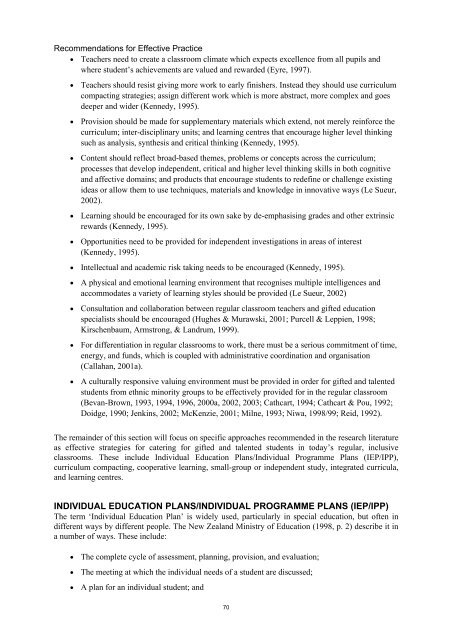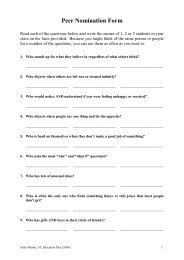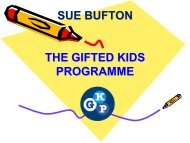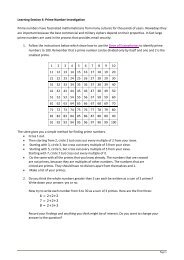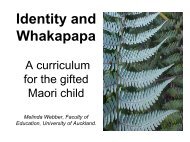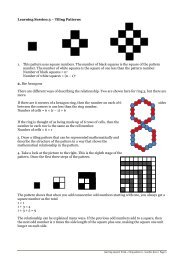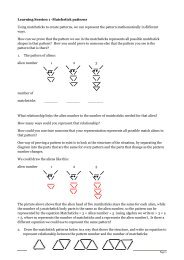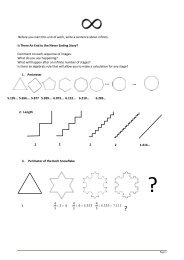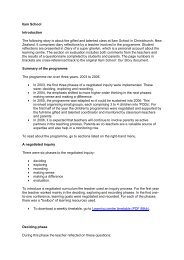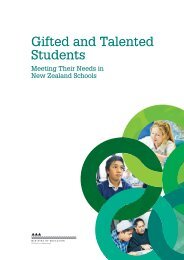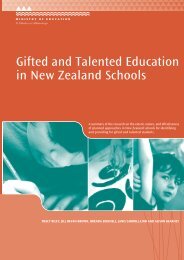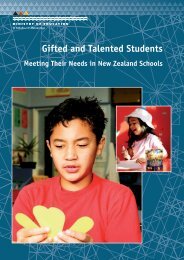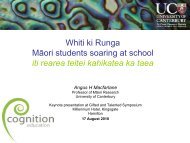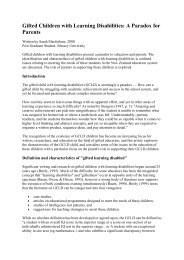The Extent, Nature and Effectiveness of Planned Approaches in ...
The Extent, Nature and Effectiveness of Planned Approaches in ...
The Extent, Nature and Effectiveness of Planned Approaches in ...
Create successful ePaper yourself
Turn your PDF publications into a flip-book with our unique Google optimized e-Paper software.
Recommendations for Effective Practice• Teachers need to create a classroom climate which expects excellence from all pupils <strong>and</strong>where student’s achievements are valued <strong>and</strong> rewarded (Eyre, 1997).• Teachers should resist giv<strong>in</strong>g more work to early f<strong>in</strong>ishers. Instead they should use curriculumcompact<strong>in</strong>g strategies; assign different work which is more abstract, more complex <strong>and</strong> goesdeeper <strong>and</strong> wider (Kennedy, 1995).• Provision should be made for supplementary materials which extend, not merely re<strong>in</strong>force thecurriculum; <strong>in</strong>ter-discipl<strong>in</strong>ary units; <strong>and</strong> learn<strong>in</strong>g centres that encourage higher level th<strong>in</strong>k<strong>in</strong>gsuch as analysis, synthesis <strong>and</strong> critical th<strong>in</strong>k<strong>in</strong>g (Kennedy, 1995).• Content should reflect broad-based themes, problems or concepts across the curriculum;processes that develop <strong>in</strong>dependent, critical <strong>and</strong> higher level th<strong>in</strong>k<strong>in</strong>g skills <strong>in</strong> both cognitive<strong>and</strong> affective doma<strong>in</strong>s; <strong>and</strong> products that encourage students to redef<strong>in</strong>e or challenge exist<strong>in</strong>gideas or allow them to use techniques, materials <strong>and</strong> knowledge <strong>in</strong> <strong>in</strong>novative ways (Le Sueur,2002).• Learn<strong>in</strong>g should be encouraged for its own sake by de-emphasis<strong>in</strong>g grades <strong>and</strong> other extr<strong>in</strong>sicrewards (Kennedy, 1995).• Opportunities need to be provided for <strong>in</strong>dependent <strong>in</strong>vestigations <strong>in</strong> areas <strong>of</strong> <strong>in</strong>terest(Kennedy, 1995).• Intellectual <strong>and</strong> academic risk tak<strong>in</strong>g needs to be encouraged (Kennedy, 1995).• A physical <strong>and</strong> emotional learn<strong>in</strong>g environment that recognises multiple <strong>in</strong>telligences <strong>and</strong>accommodates a variety <strong>of</strong> learn<strong>in</strong>g styles should be provided (Le Sueur, 2002)• Consultation <strong>and</strong> collaboration between regular classroom teachers <strong>and</strong> gifted educationspecialists should be encouraged (Hughes & Murawski, 2001; Purcell & Leppien, 1998;Kirschenbaum, Armstrong, & L<strong>and</strong>rum, 1999).• For differentiation <strong>in</strong> regular classrooms to work, there must be a serious commitment <strong>of</strong> time,energy, <strong>and</strong> funds, which is coupled with adm<strong>in</strong>istrative coord<strong>in</strong>ation <strong>and</strong> organisation(Callahan, 2001a).• A culturally responsive valu<strong>in</strong>g environment must be provided <strong>in</strong> order for gifted <strong>and</strong> talentedstudents from ethnic m<strong>in</strong>ority groups to be effectively provided for <strong>in</strong> the regular classroom(Bevan-Brown, 1993, 1994, 1996, 2000a, 2002, 2003; Cathcart, 1994; Cathcart & Pou, 1992;Doidge, 1990; Jenk<strong>in</strong>s, 2002; McKenzie, 2001; Milne, 1993; Niwa, 1998/99; Reid, 1992).<strong>The</strong> rema<strong>in</strong>der <strong>of</strong> this section will focus on specific approaches recommended <strong>in</strong> the research literatureas effective strategies for cater<strong>in</strong>g for gifted <strong>and</strong> talented students <strong>in</strong> today’s regular, <strong>in</strong>clusiveclassrooms. <strong>The</strong>se <strong>in</strong>clude Individual Education Plans/Individual Programme Plans (IEP/IPP),curriculum compact<strong>in</strong>g, cooperative learn<strong>in</strong>g, small-group or <strong>in</strong>dependent study, <strong>in</strong>tegrated curricula,<strong>and</strong> learn<strong>in</strong>g centres.INDIVIDUAL EDUCATION PLANS/INDIVIDUAL PROGRAMME PLANS (IEP/IPP)<strong>The</strong> term ‘Individual Education Plan’ is widely used, particularly <strong>in</strong> special education, but <strong>of</strong>ten <strong>in</strong>different ways by different people. <strong>The</strong> New Zeal<strong>and</strong> M<strong>in</strong>istry <strong>of</strong> Education (1998, p. 2) describe it <strong>in</strong>a number <strong>of</strong> ways. <strong>The</strong>se <strong>in</strong>clude:• <strong>The</strong> complete cycle <strong>of</strong> assessment, plann<strong>in</strong>g, provision, <strong>and</strong> evaluation;• <strong>The</strong> meet<strong>in</strong>g at which the <strong>in</strong>dividual needs <strong>of</strong> a student are discussed;• A plan for an <strong>in</strong>dividual student; <strong>and</strong>70


